CPP40307 Auction Case Study 1 & 2: Legal and Ethical Analysis
VerifiedAdded on 2022/12/14
|7
|1350
|410
Case Study
AI Summary
This document provides a comprehensive analysis of two case studies related to residential property auctions. The first case study explores scenarios involving collusion between bidders and potential conflicts of interest, outlining the legal and ethical responsibilities of the auctioneer, referencing relevant legislation such as the Land and Business (Sale and Conveyancing) Act 1994. The second case study examines situations involving aggressive bidders and withdrawal of bids, offering guidance on how to handle these situations and the legal implications. The analysis covers pre-auction requirements, bidding processes, and the finalization of sales, including the application of the Sales of Good Act and auction clauses. The document provides detailed answers to the questions posed in the case studies, supporting the responses with references to relevant legislation and legal principles. The case study covers the actions an auctioneer is required to take in different scenarios, emphasizing adherence to auction regulations and ethical conduct.
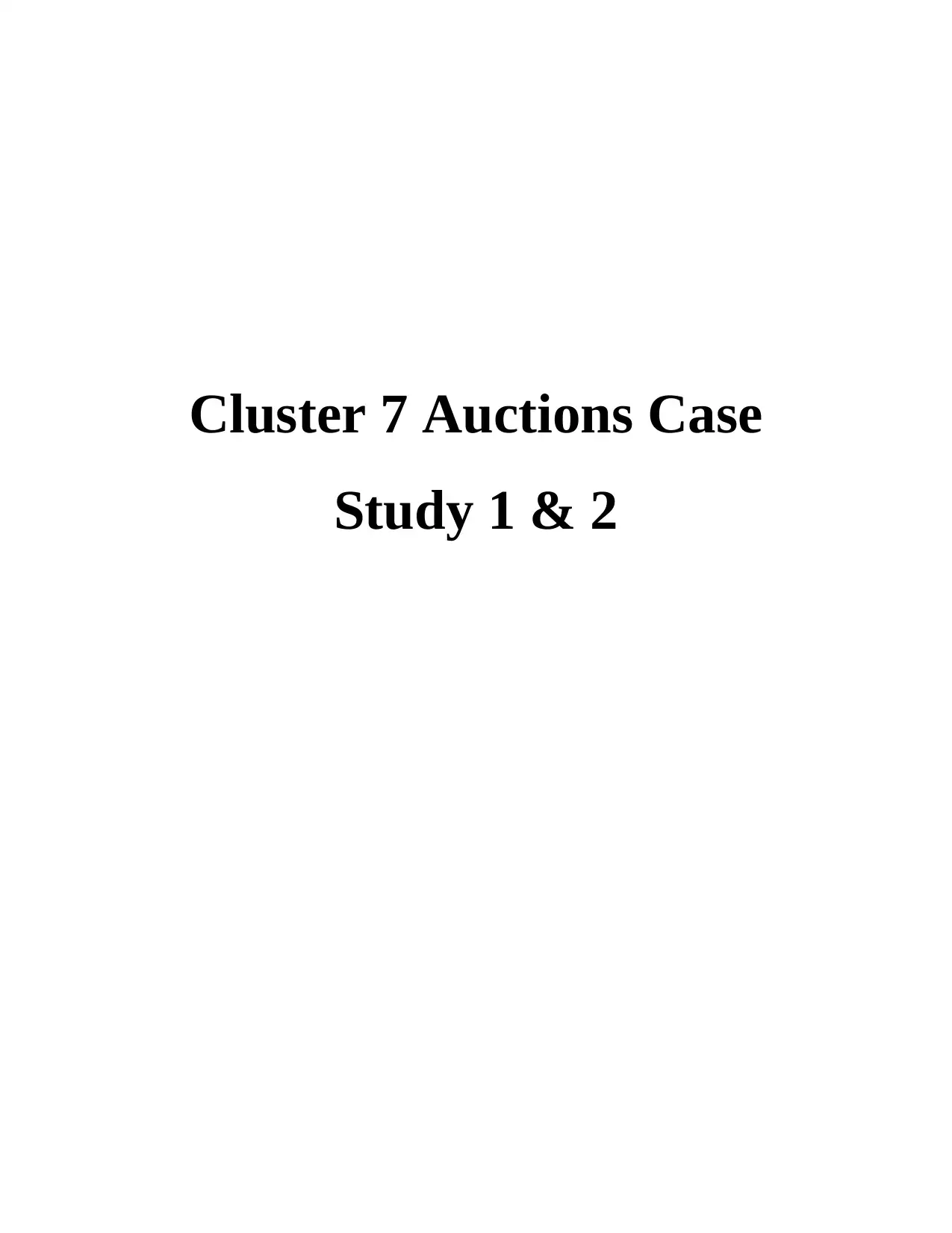
Cluster 7 Auctions Case
Study 1 & 2
Study 1 & 2
Paraphrase This Document
Need a fresh take? Get an instant paraphrase of this document with our AI Paraphraser
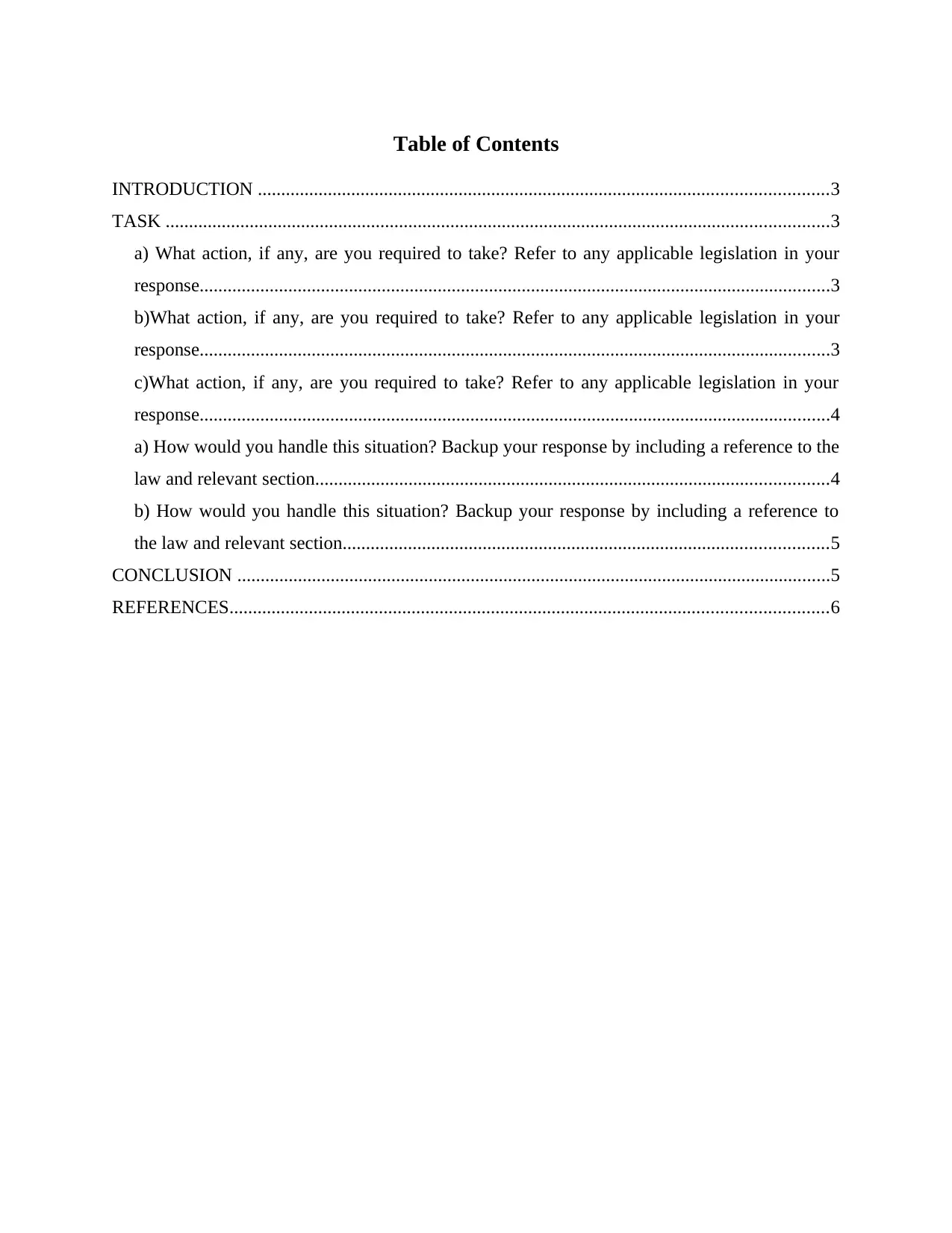
Table of Contents
INTRODUCTION ..........................................................................................................................3
TASK ..............................................................................................................................................3
a) What action, if any, are you required to take? Refer to any applicable legislation in your
response.......................................................................................................................................3
b)What action, if any, are you required to take? Refer to any applicable legislation in your
response.......................................................................................................................................3
c)What action, if any, are you required to take? Refer to any applicable legislation in your
response.......................................................................................................................................4
a) How would you handle this situation? Backup your response by including a reference to the
law and relevant section..............................................................................................................4
b) How would you handle this situation? Backup your response by including a reference to
the law and relevant section........................................................................................................5
CONCLUSION ...............................................................................................................................5
REFERENCES................................................................................................................................6
INTRODUCTION ..........................................................................................................................3
TASK ..............................................................................................................................................3
a) What action, if any, are you required to take? Refer to any applicable legislation in your
response.......................................................................................................................................3
b)What action, if any, are you required to take? Refer to any applicable legislation in your
response.......................................................................................................................................3
c)What action, if any, are you required to take? Refer to any applicable legislation in your
response.......................................................................................................................................4
a) How would you handle this situation? Backup your response by including a reference to the
law and relevant section..............................................................................................................4
b) How would you handle this situation? Backup your response by including a reference to
the law and relevant section........................................................................................................5
CONCLUSION ...............................................................................................................................5
REFERENCES................................................................................................................................6
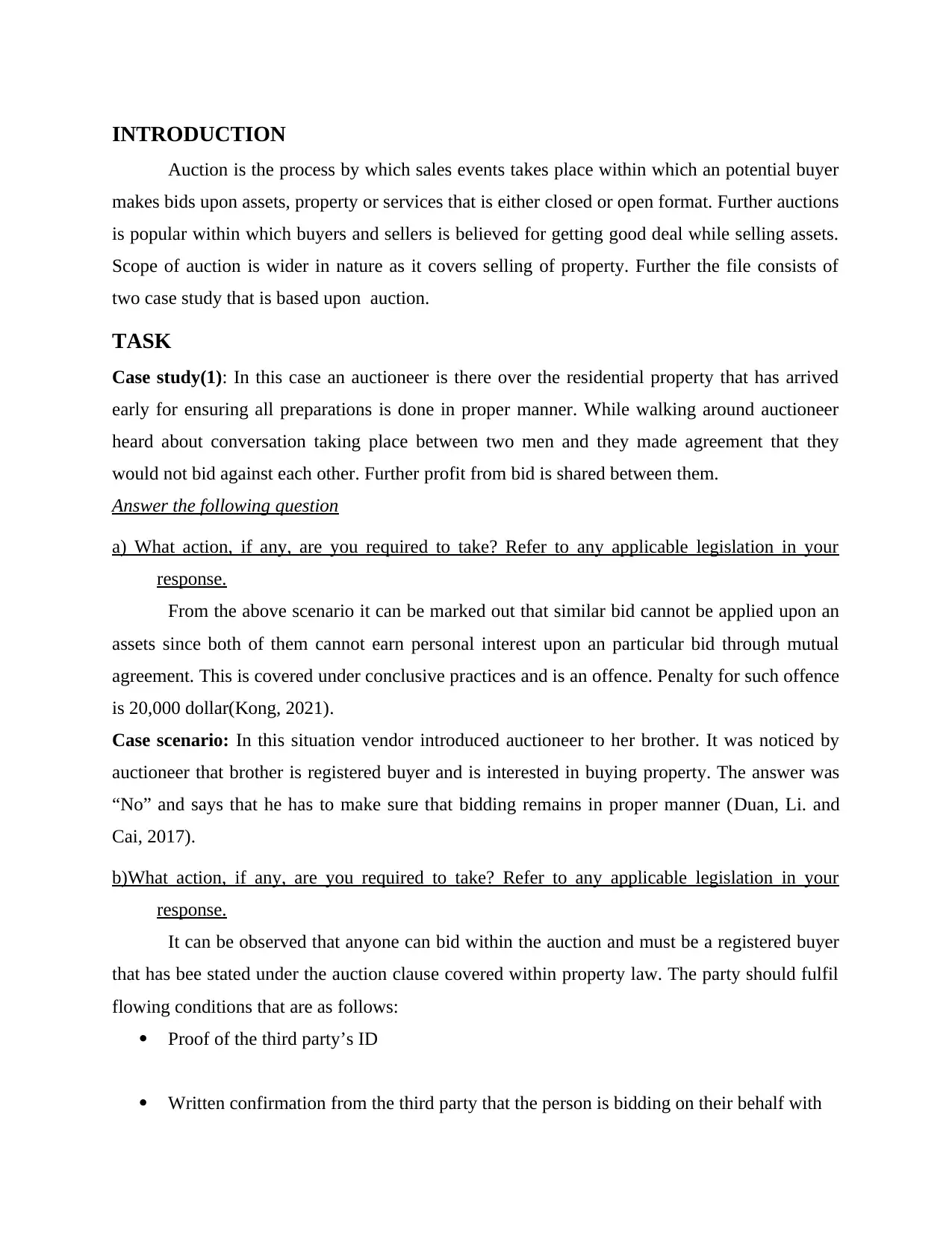
INTRODUCTION
Auction is the process by which sales events takes place within which an potential buyer
makes bids upon assets, property or services that is either closed or open format. Further auctions
is popular within which buyers and sellers is believed for getting good deal while selling assets.
Scope of auction is wider in nature as it covers selling of property. Further the file consists of
two case study that is based upon auction.
TASK
Case study(1): In this case an auctioneer is there over the residential property that has arrived
early for ensuring all preparations is done in proper manner. While walking around auctioneer
heard about conversation taking place between two men and they made agreement that they
would not bid against each other. Further profit from bid is shared between them.
Answer the following question
a) What action, if any, are you required to take? Refer to any applicable legislation in your
response.
From the above scenario it can be marked out that similar bid cannot be applied upon an
assets since both of them cannot earn personal interest upon an particular bid through mutual
agreement. This is covered under conclusive practices and is an offence. Penalty for such offence
is 20,000 dollar(Kong, 2021).
Case scenario: In this situation vendor introduced auctioneer to her brother. It was noticed by
auctioneer that brother is registered buyer and is interested in buying property. The answer was
“No” and says that he has to make sure that bidding remains in proper manner (Duan, Li. and
Cai, 2017).
b)What action, if any, are you required to take? Refer to any applicable legislation in your
response.
It can be observed that anyone can bid within the auction and must be a registered buyer
that has bee stated under the auction clause covered within property law. The party should fulfil
flowing conditions that are as follows:
Proof of the third party’s ID
Written confirmation from the third party that the person is bidding on their behalf with
Auction is the process by which sales events takes place within which an potential buyer
makes bids upon assets, property or services that is either closed or open format. Further auctions
is popular within which buyers and sellers is believed for getting good deal while selling assets.
Scope of auction is wider in nature as it covers selling of property. Further the file consists of
two case study that is based upon auction.
TASK
Case study(1): In this case an auctioneer is there over the residential property that has arrived
early for ensuring all preparations is done in proper manner. While walking around auctioneer
heard about conversation taking place between two men and they made agreement that they
would not bid against each other. Further profit from bid is shared between them.
Answer the following question
a) What action, if any, are you required to take? Refer to any applicable legislation in your
response.
From the above scenario it can be marked out that similar bid cannot be applied upon an
assets since both of them cannot earn personal interest upon an particular bid through mutual
agreement. This is covered under conclusive practices and is an offence. Penalty for such offence
is 20,000 dollar(Kong, 2021).
Case scenario: In this situation vendor introduced auctioneer to her brother. It was noticed by
auctioneer that brother is registered buyer and is interested in buying property. The answer was
“No” and says that he has to make sure that bidding remains in proper manner (Duan, Li. and
Cai, 2017).
b)What action, if any, are you required to take? Refer to any applicable legislation in your
response.
It can be observed that anyone can bid within the auction and must be a registered buyer
that has bee stated under the auction clause covered within property law. The party should fulfil
flowing conditions that are as follows:
Proof of the third party’s ID
Written confirmation from the third party that the person is bidding on their behalf with
⊘ This is a preview!⊘
Do you want full access?
Subscribe today to unlock all pages.

Trusted by 1+ million students worldwide
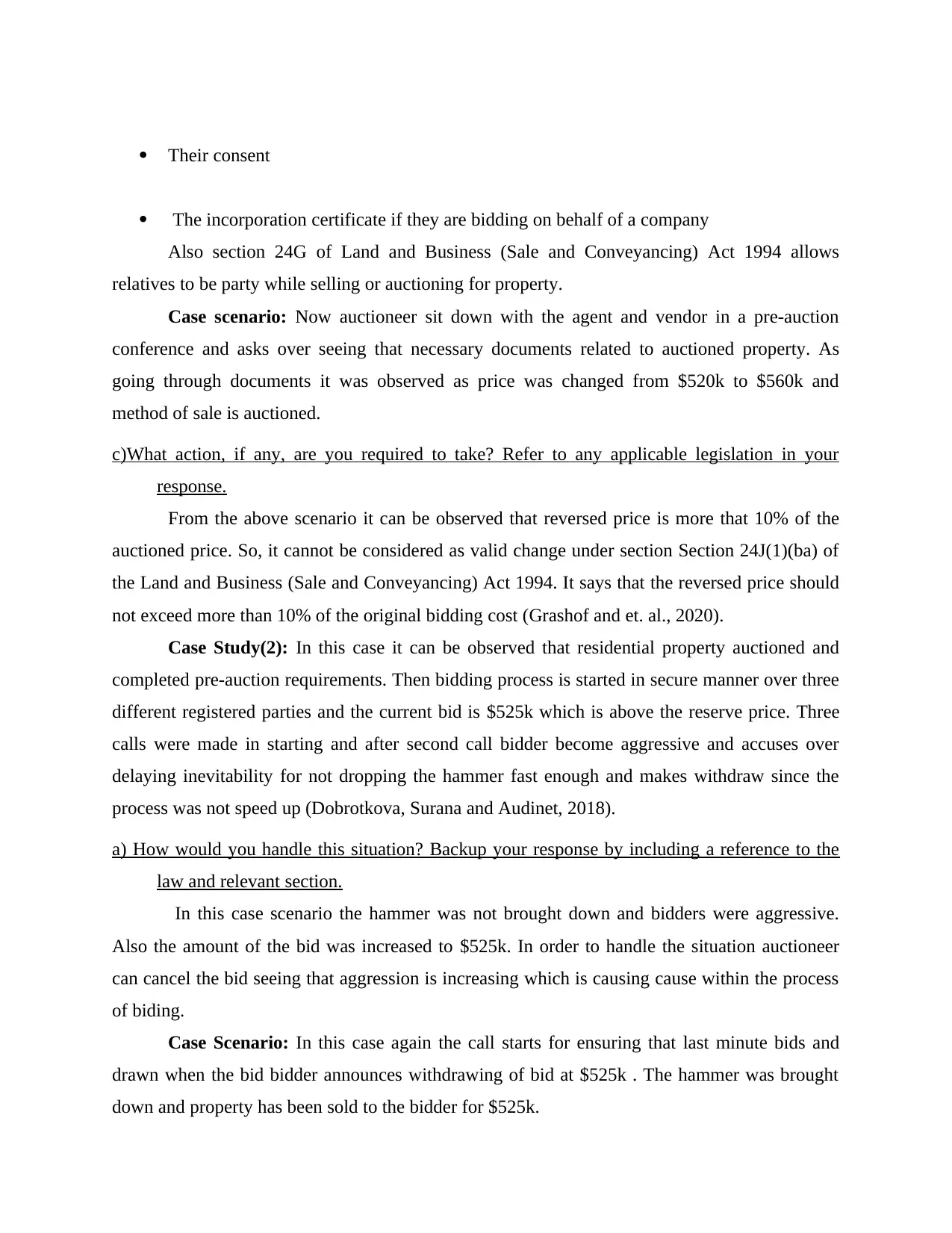
Their consent
The incorporation certificate if they are bidding on behalf of a company
Also section 24G of Land and Business (Sale and Conveyancing) Act 1994 allows
relatives to be party while selling or auctioning for property.
Case scenario: Now auctioneer sit down with the agent and vendor in a pre-auction
conference and asks over seeing that necessary documents related to auctioned property. As
going through documents it was observed as price was changed from $520k to $560k and
method of sale is auctioned.
c)What action, if any, are you required to take? Refer to any applicable legislation in your
response.
From the above scenario it can be observed that reversed price is more that 10% of the
auctioned price. So, it cannot be considered as valid change under section Section 24J(1)(ba) of
the Land and Business (Sale and Conveyancing) Act 1994. It says that the reversed price should
not exceed more than 10% of the original bidding cost (Grashof and et. al., 2020).
Case Study(2): In this case it can be observed that residential property auctioned and
completed pre-auction requirements. Then bidding process is started in secure manner over three
different registered parties and the current bid is $525k which is above the reserve price. Three
calls were made in starting and after second call bidder become aggressive and accuses over
delaying inevitability for not dropping the hammer fast enough and makes withdraw since the
process was not speed up (Dobrotkova, Surana and Audinet, 2018).
a) How would you handle this situation? Backup your response by including a reference to the
law and relevant section.
In this case scenario the hammer was not brought down and bidders were aggressive.
Also the amount of the bid was increased to $525k. In order to handle the situation auctioneer
can cancel the bid seeing that aggression is increasing which is causing cause within the process
of biding.
Case Scenario: In this case again the call starts for ensuring that last minute bids and
drawn when the bid bidder announces withdrawing of bid at $525k . The hammer was brought
down and property has been sold to the bidder for $525k.
The incorporation certificate if they are bidding on behalf of a company
Also section 24G of Land and Business (Sale and Conveyancing) Act 1994 allows
relatives to be party while selling or auctioning for property.
Case scenario: Now auctioneer sit down with the agent and vendor in a pre-auction
conference and asks over seeing that necessary documents related to auctioned property. As
going through documents it was observed as price was changed from $520k to $560k and
method of sale is auctioned.
c)What action, if any, are you required to take? Refer to any applicable legislation in your
response.
From the above scenario it can be observed that reversed price is more that 10% of the
auctioned price. So, it cannot be considered as valid change under section Section 24J(1)(ba) of
the Land and Business (Sale and Conveyancing) Act 1994. It says that the reversed price should
not exceed more than 10% of the original bidding cost (Grashof and et. al., 2020).
Case Study(2): In this case it can be observed that residential property auctioned and
completed pre-auction requirements. Then bidding process is started in secure manner over three
different registered parties and the current bid is $525k which is above the reserve price. Three
calls were made in starting and after second call bidder become aggressive and accuses over
delaying inevitability for not dropping the hammer fast enough and makes withdraw since the
process was not speed up (Dobrotkova, Surana and Audinet, 2018).
a) How would you handle this situation? Backup your response by including a reference to the
law and relevant section.
In this case scenario the hammer was not brought down and bidders were aggressive.
Also the amount of the bid was increased to $525k. In order to handle the situation auctioneer
can cancel the bid seeing that aggression is increasing which is causing cause within the process
of biding.
Case Scenario: In this case again the call starts for ensuring that last minute bids and
drawn when the bid bidder announces withdrawing of bid at $525k . The hammer was brought
down and property has been sold to the bidder for $525k.
Paraphrase This Document
Need a fresh take? Get an instant paraphrase of this document with our AI Paraphraser
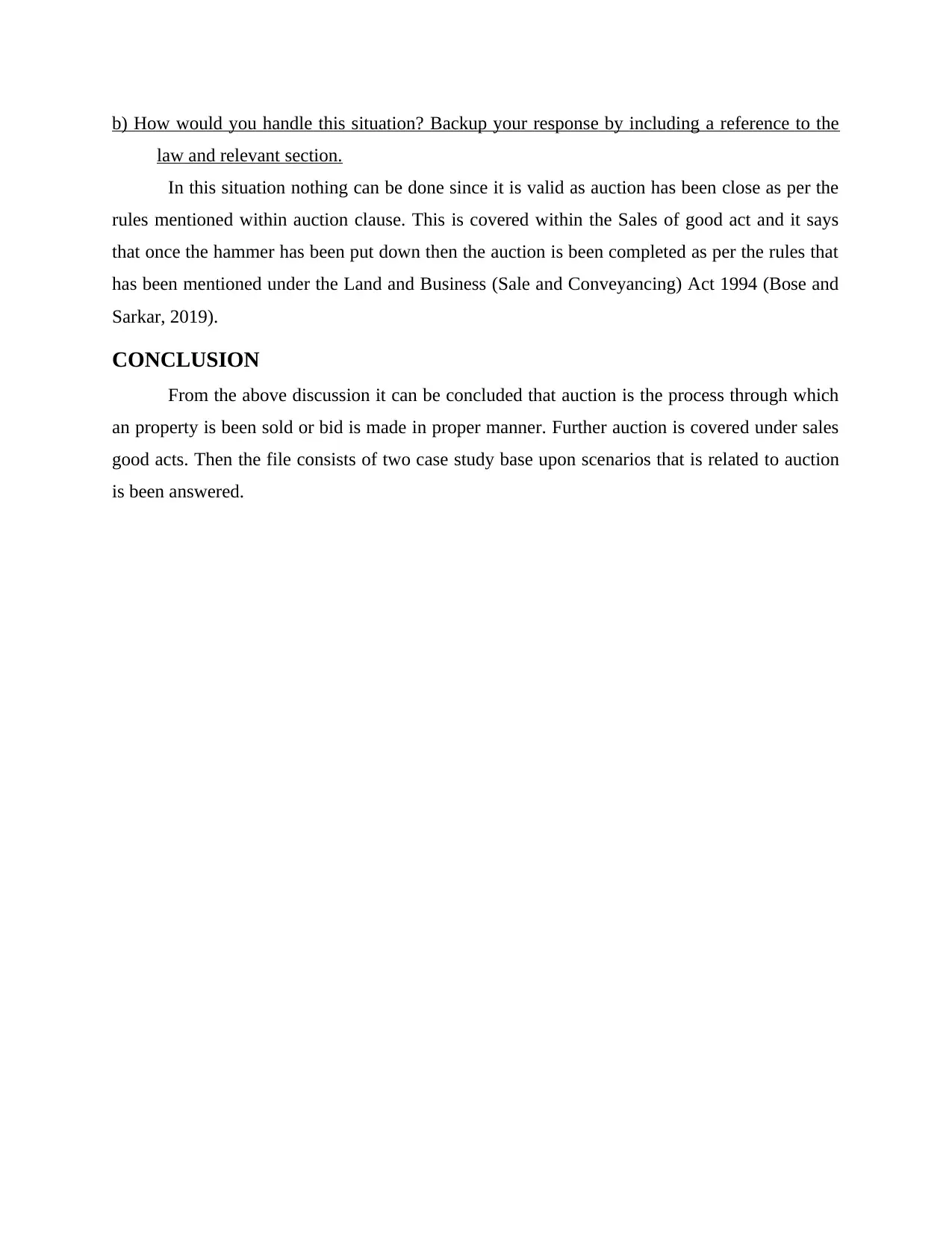
b) How would you handle this situation? Backup your response by including a reference to the
law and relevant section.
In this situation nothing can be done since it is valid as auction has been close as per the
rules mentioned within auction clause. This is covered within the Sales of good act and it says
that once the hammer has been put down then the auction is been completed as per the rules that
has been mentioned under the Land and Business (Sale and Conveyancing) Act 1994 (Bose and
Sarkar, 2019).
CONCLUSION
From the above discussion it can be concluded that auction is the process through which
an property is been sold or bid is made in proper manner. Further auction is covered under sales
good acts. Then the file consists of two case study base upon scenarios that is related to auction
is been answered.
law and relevant section.
In this situation nothing can be done since it is valid as auction has been close as per the
rules mentioned within auction clause. This is covered within the Sales of good act and it says
that once the hammer has been put down then the auction is been completed as per the rules that
has been mentioned under the Land and Business (Sale and Conveyancing) Act 1994 (Bose and
Sarkar, 2019).
CONCLUSION
From the above discussion it can be concluded that auction is the process through which
an property is been sold or bid is made in proper manner. Further auction is covered under sales
good acts. Then the file consists of two case study base upon scenarios that is related to auction
is been answered.
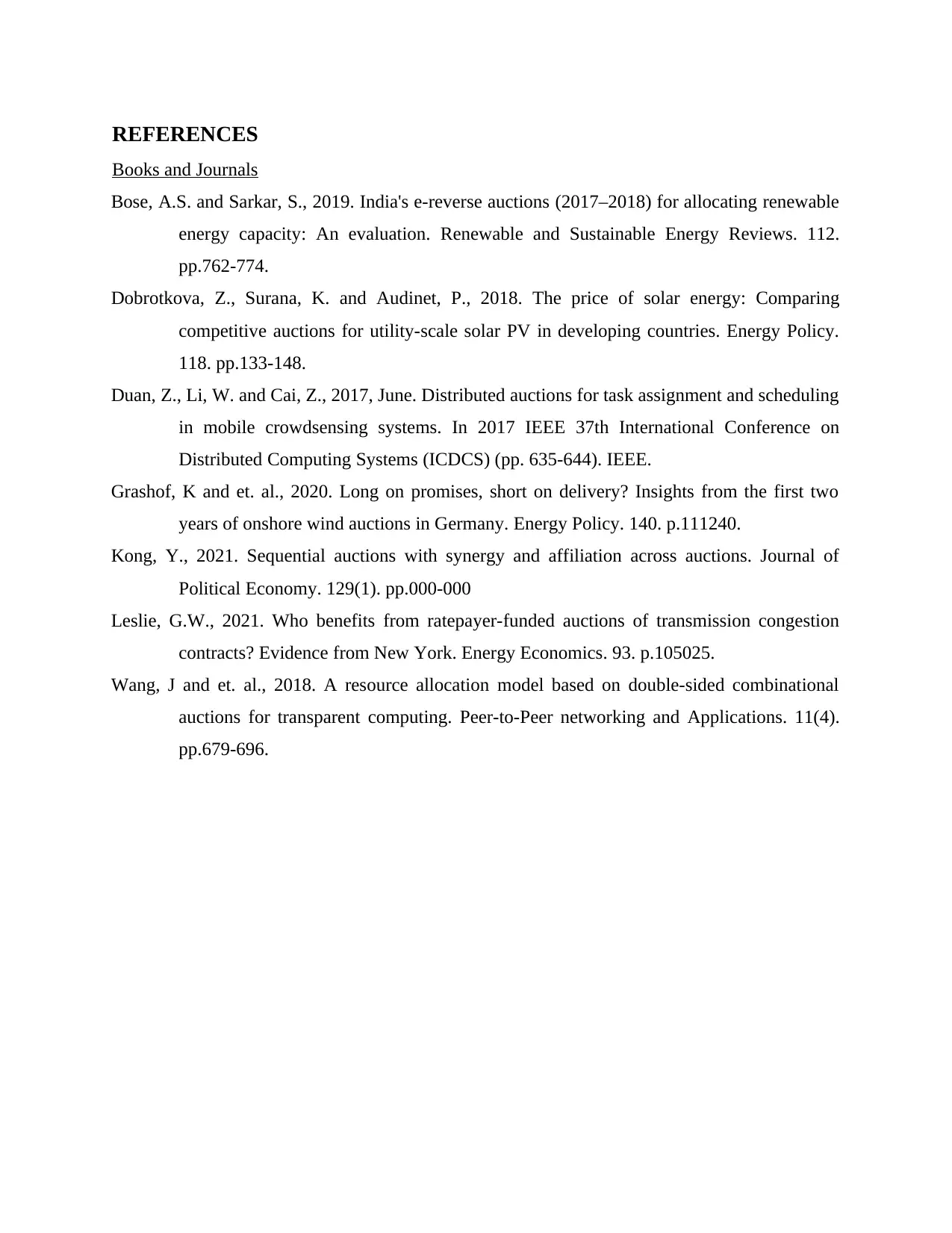
REFERENCES
Books and Journals
Bose, A.S. and Sarkar, S., 2019. India's e-reverse auctions (2017–2018) for allocating renewable
energy capacity: An evaluation. Renewable and Sustainable Energy Reviews. 112.
pp.762-774.
Dobrotkova, Z., Surana, K. and Audinet, P., 2018. The price of solar energy: Comparing
competitive auctions for utility-scale solar PV in developing countries. Energy Policy.
118. pp.133-148.
Duan, Z., Li, W. and Cai, Z., 2017, June. Distributed auctions for task assignment and scheduling
in mobile crowdsensing systems. In 2017 IEEE 37th International Conference on
Distributed Computing Systems (ICDCS) (pp. 635-644). IEEE.
Grashof, K and et. al., 2020. Long on promises, short on delivery? Insights from the first two
years of onshore wind auctions in Germany. Energy Policy. 140. p.111240.
Kong, Y., 2021. Sequential auctions with synergy and affiliation across auctions. Journal of
Political Economy. 129(1). pp.000-000
Leslie, G.W., 2021. Who benefits from ratepayer-funded auctions of transmission congestion
contracts? Evidence from New York. Energy Economics. 93. p.105025.
Wang, J and et. al., 2018. A resource allocation model based on double-sided combinational
auctions for transparent computing. Peer-to-Peer networking and Applications. 11(4).
pp.679-696.
Books and Journals
Bose, A.S. and Sarkar, S., 2019. India's e-reverse auctions (2017–2018) for allocating renewable
energy capacity: An evaluation. Renewable and Sustainable Energy Reviews. 112.
pp.762-774.
Dobrotkova, Z., Surana, K. and Audinet, P., 2018. The price of solar energy: Comparing
competitive auctions for utility-scale solar PV in developing countries. Energy Policy.
118. pp.133-148.
Duan, Z., Li, W. and Cai, Z., 2017, June. Distributed auctions for task assignment and scheduling
in mobile crowdsensing systems. In 2017 IEEE 37th International Conference on
Distributed Computing Systems (ICDCS) (pp. 635-644). IEEE.
Grashof, K and et. al., 2020. Long on promises, short on delivery? Insights from the first two
years of onshore wind auctions in Germany. Energy Policy. 140. p.111240.
Kong, Y., 2021. Sequential auctions with synergy and affiliation across auctions. Journal of
Political Economy. 129(1). pp.000-000
Leslie, G.W., 2021. Who benefits from ratepayer-funded auctions of transmission congestion
contracts? Evidence from New York. Energy Economics. 93. p.105025.
Wang, J and et. al., 2018. A resource allocation model based on double-sided combinational
auctions for transparent computing. Peer-to-Peer networking and Applications. 11(4).
pp.679-696.
⊘ This is a preview!⊘
Do you want full access?
Subscribe today to unlock all pages.

Trusted by 1+ million students worldwide

1 out of 7
Related Documents
Your All-in-One AI-Powered Toolkit for Academic Success.
+13062052269
info@desklib.com
Available 24*7 on WhatsApp / Email
![[object Object]](/_next/static/media/star-bottom.7253800d.svg)
Unlock your academic potential
Copyright © 2020–2026 A2Z Services. All Rights Reserved. Developed and managed by ZUCOL.





